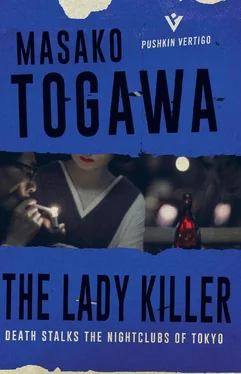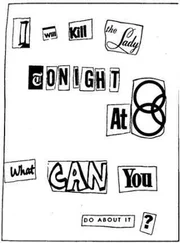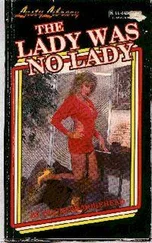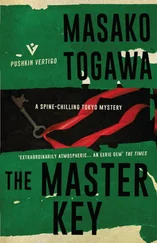Prey had a strong head for drink. Anyway, no resistance, no hysterics, no overacting. Just put herself into my hands. Felt like a god accepting a human sacrifice.
Did her best to satisfy my every need, but was too tense and kept trembling. Took two hours to kill. She was a virgin; drew blood.
“Silly, silly little girl. Don’t say you cried in his arms; don’t tell me that you were crushed under his body. Don’t try and tell me any of those things. I bet you were biting your lip with those sharp little teeth of yours that you always kept so clean; I bet you bit so hard that the blood came. Silly little girl!
“Silly to shed blood for his enjoyment! That man, to steal two hours of pleasure, pressed his filthy lips against your girlish and unsullied skin. He left his sticky seed of sin within your childlike body, not yet mature, and all for his own selfish satisfaction! Was it in spite of that seed, or was it because of it, that seed growing in your body, that you were forced to die? And as you were preparing to kill yourself, that man had long forgotten you and was tasting the flesh of some other woman… But it’s all right now, darling; don’t cry any more. Curse him no more, though you lie underground being eaten by worms!
“For I have taken revenge, in spite of these sounds in my head. I have put him away into prison, where he can never touch any woman’s body again. Now he faces the hard wall of a cold cell, doubtless inscribing upon it your name, yours and the names of many other women, with his anecdotes of those nights spent together. Soon, they will take him away and hang him, and then they will place a heavy tombstone above him. It will press down upon him firmly so he won’t be able to budge an inch ever again. So there! Instead of pressing himself upon your body, upon the bodies of other women, the stone will press him! Cruel stone, press him!
“Now let me tell you how I made that man taste the same agony with which he fed you…”
THE BLACK STAIN—CONTINUED
1
A week passed after the advertisement was placed in the newspaper, and many leads came about Tsuneko Obana, but all of them were false trails. And then there came the first real clue. It was from the manager of an apartment building called the Midori-so, the building where Mitsuko Kosugi was murdered. He reported that a woman with a mole on the right side of her nose had been residing there under the name Keiko Obana since last September.
The woman was a little over thirty and worked as a model for a cosmetics company. This work took her to department stores the length and breadth of Japan, so she only spent about two days a week in the apartment. And for the last two months, she had not shown up at all.
“Well, she’d paid six months in advance, so at first I thought nothing of it. But recently I got worried and was thinking of going to the police, when I saw your advertisement.”
The manager, who had the air of a war veteran, talked in tones that bespoke his honesty. His linen suit, shiny with age, was well pressed and stank of mothballs; obviously, it was only worn on special occasions. The mole, the age, the recent disappearance… all added up to the elusive Tsuneko Obana.
“Right under our noses, so we didn’t see it!” Shinji exclaimed. The old man said nothing, and Shinji then reflected that there was something fishy; why use Keiko Obana’s name? Wasn’t that a giveaway?
The old man seemed to be thinking the same thing; he chewed his cigar in a perplexed manner.
“Let us suppose that the woman really is Tsuneko Obana, as seems likely,” he said. “Then it seems that she used her sister’s name to make clear her intention of revenging her sister. In that case, we can presume that she has vanished again, this time perhaps for good.”
At all events, they decided to visit the apartment immediately. The old man sent for his secretary and told her to give the manager the reward, which was handed over in a brown paper envelope, the manager protesting politely at first. A hire car was called, and soon they reached the Midori-so at Asagaya. Until they arrived there, the old man spoke not one word but merely pondered, chewing his cigar the while.
First of all, they looked into Mitsuko Kosugi’s room. In spite of the housing shortage, no one had moved in—naturally enough, in view of the fact that somebody had been murdered there. Both the door and the windows stood open, as if to wash out some half-sensed odor of the mortuary.
There was nothing to see, so they went upstairs to the Obana room.
It was very neat and tidy. The manager, half-fearfully, opened the door of the closet, but it proved to contain no more than a set of bedding. All seemed in order, and yet Shinji felt strangely uncomfortable. Why did the woman with a mole rent this apartment under the name of a dead woman? Why had she now abandoned it? He thought of hermit crabs moving from shell to shell; had she not thus, once more, effected her escape? Would she ever return? Where was she now?
A deep sense of disappointment suffused his body and mind.
He went to the window and looked out. The street below, with its stepping-stones set in the mud, looked commonplace and dirty by the light of day. But at night, in the dark, would it not become the theater of horror from which Ichiro Honda had stumbled?
The old man called him, and he turned and went over to the low Japanese table where Hatanaka was standing. The drawer was open, and the old man was pointing at a large notebook that lay within. Shinji’s body tensed with a thrill similar to vertigo.
“The Huntsman’s Log!” he breathed.
“Yes,” said the old man, turning the pages quickly, staring at them myopically through his thick glasses. “But the passage about Keiko Obana has been removed.” He showed Shinji where the pages had been violently torn out.
“Did you find something?” asked the manager.
“This,” said the old lawyer, quickly slipping it into his pocket. “And I’m going to keep it as evidence.” On such occasions, Hatanaka was adept at glossing over the boundary between the requirements of the law and of reality.
Impressing upon the manager the need to contact them immediately if Obana showed up, they left the Midori-so. In the car, Shinji broke the silence.
“Will she come back?”
The old man shook his head. “I don’t think so. The bird has flown, all right. She left the Huntsman’s Log deliberately, just for someone like us to find if we could.” He began to read the diary with care, Shinji peering over his shoulder.
He saw the passage referring to Michiko Ono, the librarian, and he felt a stabbing pain in his heart. He turned away and gazed out of the window.
The town lay in the dust of a summer’s afternoon. The air conditioner of the car was blowing on his neck, no matter how he moved. They passed Shinjuku Station; some construction work was going on in the forecourt, and there was a temporary wooden sidewalk laid, over which the crowds moved slowly through the summer heat. Dump trucks came and went, dropping piles of earth onto the road.
Of what avail had it been for him to visit men with Rh-negative blood and to track down the woman with the mole? Was he not, in spite of it all, no more than a bystander? The real protagonists—Ichiro Honda, Michiko Ono, the woman with the mole, the murdered women, even—they had gone to the edge and looked down into the depths of life, and in some cases had returned. He had been nowhere. He had watched from the outside.
The old man was still buried in the diary. He looked up, beaming. “He really has got a good memory!” he exclaimed. “His reconstruction was almost perfect, even down to the order of things!” He turned the pages again, and suddenly his face stiffened.
Читать дальше












